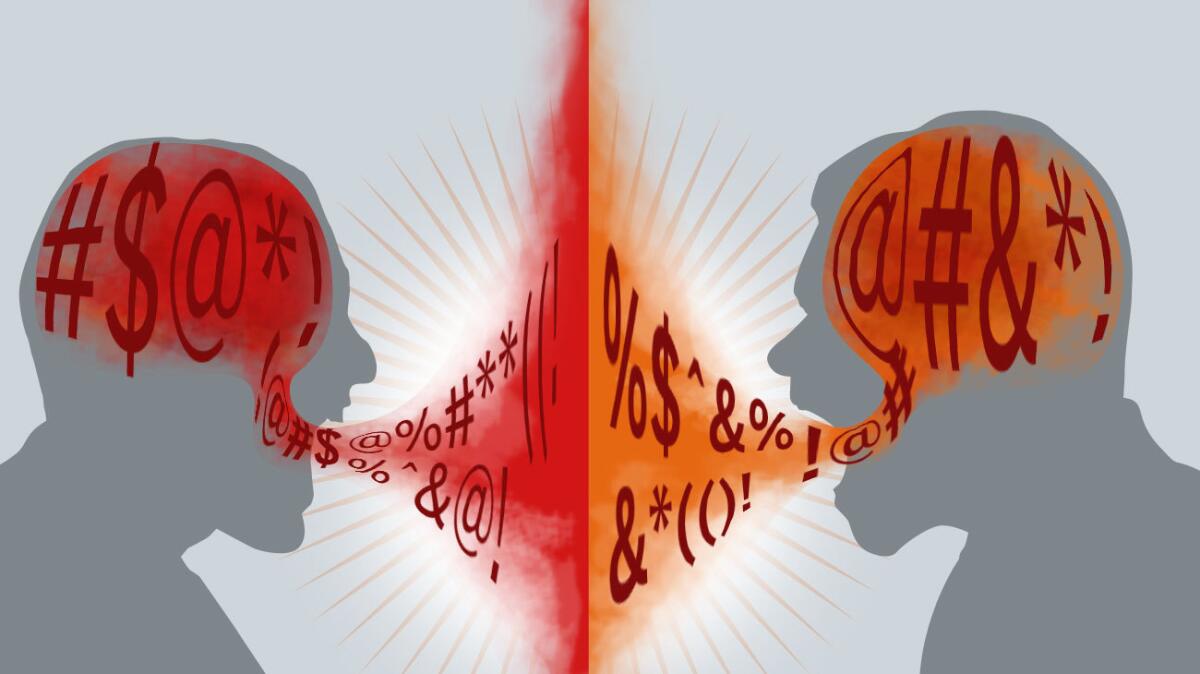In Germany, it can be a crime to insult someone in public

- Share via
Reporting from BERLIN — A man who unleashed a string of expletives at a mass shooter in Munich, Germany, back in July could have faced charges from the state prosecutor. The reason? A 19th century law that makes it a crime to disparage another person.
After Ali Sonboly went on a rampage that killed nine people, he stood on the roof of a parking garage and engaged in a strange shouting match with a man on a nearby balcony. Thomas Salbey, a 57-year-old backhoe operator, hurled a seemingly never-ending stream of epithets at the teenage gunman and threw a beer bottle at him; the profanity-laced exchange was captured in a cellphone video that was widely shared on social media and TV news.
A local woman requested that charges be brought against Salbey after watching the clip on television — and, if charged, Salbey could have ended up in jail for a year or faced a hefty fine for his coarse language.
After an examination, the prosecutors opted not to pursue charges. For one thing, the woman who filed the complaint was confused about the timing. “She thought that the insults were made before he went on the rampage and might have provoked him, when actually the shooting had already ended,” state prosecutor Florian Weinzierl said.
And the insulted party was, after all, dead. The gunman killed himself shortly after the video was taken — and it was not his family who sought charges, which would have given the complaint a greater chance of success.
But the surreal episode offered an insight into a quirk of the German legal system, and the potential risk lurking for anyone who may turn to four-letter words in anger.
The Beleidigunggesetz, or law protecting people against insults, isn’t always enforced, but certainly can be. “The law against insulting another person in public has been on the books since 1871, and it can be taken quite seriously in Germany,” said Volker Schmitt, a lawyer based in Berlin.
Paragraph 185, Section 14 of the criminal code still reads almost exactly as it was written 145 years ago: “An insult shall be punished with imprisonment not exceeding one year or a fine and if the insult is committed by means of an assault with imprisonment not exceeding two years.”
“The law is designed to protect people’s honor,” said Karsten Gulden, a lawyer who specializes in the issue. “Respect for people and their reputation enjoys legal protection, and shouldn’t be verbally violated.”
There were 218,414 cases of insults filed with prosecutors in Germany in 2015, down slightly from 225,098 in 2014, but far above numbers of around 150,000 recorded a decade ago. Americans and other foreigners living in Germany sometimes run afoul of the law, unaware of it, and end up being called into police or prosecutor’s offices to explain their side of the story, before their cases are usually dismissed.
Hardly anyone ends up in jail for insulting their neighbor in the midst of a heated dispute, or for flashing the middle finger — the Stinkefinger, or “stinky finger,” as Germans call it — at another motorist in heavy traffic. But cases do wind up in court and fines are sometimes handed down.
In a precedent-setting 1995 ruling, a Schwaebisch Hall court awarded a man 460 euros over racist comments against his wife, who is black. In 1997, a boss who called a pregnant employee “Germany’s laziest worker” in an in-house magazine was fined 2,500 euros. In 1998, a court in Heilbronn awarded a police officer 350 euros after another person called him a “wanker.”
The law extends to insults made online as well. “If someone makes comments on the Internet that violate the law, German authorities have the right to obtain data from the providers about the person who made the comments in order to go after the perpetrator,” said Gulden.
A Berlin court awarded one person 8,190 euros in 2011 for insults published against him in social media; in a 2012 case, a trainee who made disparaging remarks about her boss on Facebook had to pay 2,500 euros in damages. A student accepted a 5,000 euro out-of-court settlement in 2013 for racist remarks made in a rap song about him posted on YouTube. The 13-year-old’s family had originally demanded 14,000 euros in court.
Gulden said there are many classic insults that can land you in court, provided there is a witness or some record that they were used: “old Nazi,” “fascist,” “pig,” “Scheiss Bulle” (an insult for police) or “Krueppel” (cripple).
In a case that went all the way to the country’s highest court, German President Joachim Gauck came under investigation after he called members of the far-right NPD party “Spinner” (“nutcases”) during a 2013 discussion about the party’s anti-immigrant positions. The NPD filed the complaint, but the head of the Constitutional Court dismissed the case, saying Gauck was exercising free speech.
More recently, Vice Chancellor Sigmar Gabriel consciously ran the risk of being charged for insulting a neo-Nazi, when he gave the Stinkefinger to a young man hectoring him after a speech. He did not face charges — and later told public broadcaster ZDF that his only regret was not using both hands.
Insulting Germany itself is also potentially punishable by law — Paragraph 90 of the criminal code outlaws the “defamation of the state and its symbols.” At a protest in Berlin last year over the government’s austerity policies toward Greece, 21 people came under police investigation for holding up a sign that referred to Germany as a miserable piece of excrement (“Deutschland, du mieses Stueck Scheisse!”). The state prosecutor later dropped the case.
Foreign leaders too can seek satisfaction in German courts if they feel they have been insulted. The Turkish government demanded that German comedian Jan Boehmermann be prosecuted over a satirical poem suggesting President Recep Tayyip Erdogan engaged in sexual acts with goats. The state prosecutor’s office in Mainz is investigating Boehmermann on criminal charges. Boehmermann is also facing a separate civil suit from Erdogan for slander; a court in Hamburg is expected to rule in November.
But the strict law in Germany does have one key positive effect, Gulden noted: Disputes remain more or less civilized.
“It means that a lot of people think twice about what they write and say,” he said.
Kirschbaum is a special correspondent.
ALSO
Mother Teresa declared a saint as Pope Francis lauds her in Vatican ceremony
Germany opened its doors to refugees a year ago, but some residents have had enough
A year later, legacy of refugee crisis has Greeks fearing paradise lost
More to Read
Sign up for Essential California
The most important California stories and recommendations in your inbox every morning.
You may occasionally receive promotional content from the Los Angeles Times.










